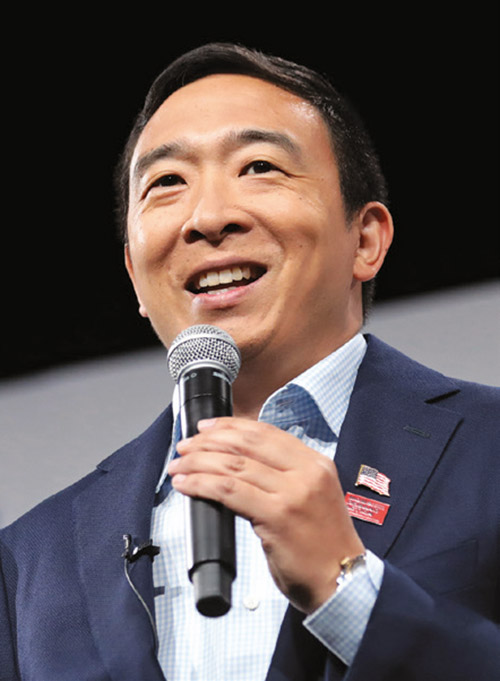
Andrew Yang, who in most polls is the frontrunner to capture the Democratic nomination for New York City mayor in a crowded June 22 primary, has won the support of some key Orthodox lawmakers and groups for his stand on issues ranging from defending yeshivot to strong criticism of the boycott, divestment and sanctions campaign against Israel.
Yang, who unsuccessfully sought the nomination for president in the recent election, has been endorsed by two Democratic Brooklyn Orthodox political figures, state Assemblyman Simcha Eichenstein, whose District 48 encompasses Midwood and Borough Park, and Councilman Kalman Yeger, whose district includes all or parts of Bensonhurst, Borough Park, Gravesend, Kensington and Midwood. Yang has also received the support of Assemblyman Daniel Rosenthal (D-Dist. 27), whose central Queens district, which includes Kew Gardens Hills, represents a large Jewish voting bloc.
Additionally, a coalition of chasidic sects—that includes Bobov, Belz and Satmar—called Borough Park United has endorsed Yang, who during the campaign has met with Jewish leaders and toured kosher stores, Judaica shops and yeshivot and engaged in significant outreach to the Jewish community in an effort to win the votes of a major contingent in the city. Yang has defended yeshivot against charges that they failed to meet educational standards and has said he favored giving them independence. He has also labeled the BDS campaign antisemitic and fascist.
In an effort to forge a conduit with Jewish voters, Yang appointed David Schwartz, a District 48 leader and first vice chair to the Brooklyn Democratic County Committee, as liaison to the Jewish community.
“David has been a strong voice, advocating for the rights of the Jewish community and for building bridges to bring people together,” said Yang in a statement. “I look forward to working with David on the challenges facing New York’s Jewish community and finding solutions for how we can all move forward together.”
In response to the recent barrage of rocket fire upon Israel, Yang tweeted: “I’m standing with the people of Israel who are coming under bombardment attacks, and condemn the Hamas terrorists. The people of NYC will always stand with our brothers and sisters in Israel who face down terrorism and persevere.”
The son of immigrants from Taiwan, Yang grew up in Schenectady and Westchester before moving to New York City after graduating Brown University. He earned a law degree from Columbia University Law School. Yang began working in start-ups, and in 2006, joined the Manhattan test-prep company Manhattan GMAT, where he had previously worked as a tutor. The company was sold by Yang and his partners to Kaplan Test Prep in 2009. Two years later he started the nonprofit Venture for America to revitalize American cities by placing young entrepreneurs in a two-year fellowship program at start-ups in those urban locales.
His campaign centers on such items as bridging divides between communities, attending to the needs of the 40% of city residents who live below or at the poverty line and building an educational system that is “outcomes-based,” according to Yang’s website. Among his other core policy commitments are accelerating equitable vaccine delivery, building a public bank to support small business and implementing his “signature” cash-relief program for 500,000 of the city’s poorest residents.
Noting that the COVID-19 pandemic has hit the poorest New Yorkers especially hard, particularly those of color and immigrants, Yang said on his website that second only to housing subsidies, direct cash transfers and tax credits are the most critical components in helping these families get back on their feet. If elected, Yang plans to launch the largest basic income program in the nation, investing $1 billion, whereby the 500,000 in greatest need would receive a basic income to help lift them out of poverty. Each of these families living in “extreme poverty” would receive $2,000 annually to start, and the program would be expected to grow over time with public and philanthropic support, with a goal of eventually ending poverty in the city.
It is reminiscent of his Yang’s “freedom dividend” that he proposed during his presidential run that would pay every American a basic income of $1,000/month as a response to job replacement by automation.
He cites studies that have shown lifting people out of extreme poverty increases mental and physical health and decreases crime.
“By reducing crime, hospital visits and homelessness, this basic income program will decrease the costs associated with these social ills and allow the cash relief program to grow over time,” his website states.
Among other initiatives, he also will appoint a head of small business support so that there is one point person responsible to contact, reduce red tape and create a low- or no-interest loan program for small businesses that meet certain criteria.
By Debra Rubin










